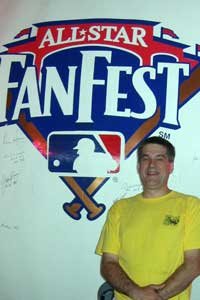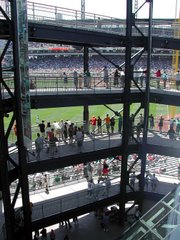Today's standings show the Pittsburgh Pirates in the lofty position of second place, a ranking that has a lot more to do with the mediocrity of the National League Central than anything the Buccos are doing.
No matter where they show up in the final standings, the Pirates are on their way to a 15th consecutive losing season, which will be only one year away from tying the major-league record.
The Phillies went from 1933 to 1948 without ever seeing .500, but that's only part of the story of the suffering of Philadelphia baseball fans.
Our story starts with the final out of the 1914 World Series, with the Philadelphia Athletics being swept in four straight games by the Boston Braves, a team that had been in last place in the National League as of mid-July. According to legend, A's manager/owner Connie Mack was so humiliated by his team's performance that he sold off most of his star players. More likely, Mack was feeling financial pressure from the Federal League, the last "third" major league, the presence of which was driving up salaries throughout baseball. Earlier in 1914, Mack had passed on acquiring a lefthanded pitcher who was tearing it up for the minor-league Baltimore Orioles. If Mack hadn't already been planning to dump payroll, George Herman Ruth might have spent his early career in Philadelphia.
As it turned out, the A's went into a free-fall of epic proportions in 1915, blundering their way to a 43-109 record. It got worse in 1916, when the Athletics fielded a team that compiled a winning percentage that was lower than the '62 Mets. One member of the pitching staff, Jack Nabors, lost 20 games while posting only a single victory. The A's went on to finish last in the American League a record seven straight seasons.
Meanwhile, the situation was much better across town, where the Phillies won their first pennant in 1915, losing to the Red Sox in the World Series. With Grover Cleveland Alexander winning at least 30 games annually from 1915-17, the future didn't look so bad.
All that changed when the Phils, wary of Alexander's draft status during World War I, traded him to the Cubs prior to the 1918 season. Sure enough, Alexander went into military service, but Chicago had the last laugh, making it to the World Series without much of a contribution from him. The Phillies, meanwhile, won 33 fewer games than the previous year. They stayed below .500 for 14 straight seasons.
Meanwhile, Mack decided to spend some money again in the mid-'20, including doing substantial business with the Orioles. In fact, he paid a then-record price to obtain another left-handed pitcher, Robert Moses Grove. With several future Hall of Famers on the squad, the A's won three straight pennants, 1929-31.
Even though the Athletics fell short in 1932, it was a milestone year for Philadelphia baseball, one of only two seasons between 1913 and when the A's bolted for Kansas City during which both of the city's major-league teams finished above .500. The Phils finished at 78-76, with star outfielder Chuck Klein winning the MVP award and having the rare distinction of leading the National League in home runs and stolen bases. He won the Triple Crown in 1933, but the cash-strapped Phillies shipped him to the Cubs after the season.
Blaming the Depression this time, Mack started dismantling his team again, and by 1934 the A's were below .500 again.
Thus began the most horrible stretch of baseball a city has had to endure, which might help explained the ingrained bitterness of Philadelphia fans. For 13 straight seasons, neither the A's nor the Phillies came anywhere near cracking the .500 mark. The Phils finally moved out of the half-century-old ballpark known as the Baker Bowl in 1938, but it didn't help matters. The team lost more than 100 games five straight seasons, culminating with a wretched '42 club that finished 42-109 while finishing last in batting average, earned run average and fielding average.
The final year of World War II might have been the worst of all for Philadelphia. Both teams finished dead last, the Phillies at 46-108 the A's slightly better at 52-98.
Mack's team had a bit of a resurgence in the late '40s, winning more than it lost each year from 1947-49. But it was back to the basement in 1950, and after managing the franchise since the day it started operating in 1901, the 87-year-old Mack, who attended every game dressed in a shirt with starched collar instead of a uniform, finally called it quits.
The Phillies meanwhile started winning, too, after finally producing a decent crop of young players, including future Hall of Famers Richie Ashburn and Robin Roberts. The so-called Whiz Kids finally made it back to the World Series in 1950, although the celebration was short-lived, as they were swept by the Yankees.
So, Pittsburgh fans, it could be a lot worse for you. That's not to say it won't in the future ...
Subscribe to:
Post Comments (Atom)









No comments:
Post a Comment